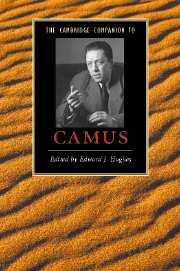Book contents
- Frontmatter
- Introduction
- PART I: BIOGRAPHY AND INFLUENCES
- 1 Camus: a life lived in critical times
- 2 Situating Camus: the formative influences
- 3 Autobiographical soundings in L’Envers et l’Endroit
- PART II: THEMES, PREOCCUPATIONS AND GENRES
- PART III: TEXTS AND CONTEXTS
- Postface
- Guide to Further reading
- Index
- Series List
3 - Autobiographical soundings in L’Envers et l’Endroit
from PART I: - BIOGRAPHY AND INFLUENCES
Published online by Cambridge University Press: 28 September 2007
- Frontmatter
- Introduction
- PART I: BIOGRAPHY AND INFLUENCES
- 1 Camus: a life lived in critical times
- 2 Situating Camus: the formative influences
- 3 Autobiographical soundings in L’Envers et l’Endroit
- PART II: THEMES, PREOCCUPATIONS AND GENRES
- PART III: TEXTS AND CONTEXTS
- Postface
- Guide to Further reading
- Index
- Series List
Summary
Le même vertige qui avait saisi l'enfant que j'étais a obscurci mes yeux d'homme.
(TRN, 1423-4)[I] felt the same horror sweep over me now I was a man as I had previously felt as a child.
(P, 193)The collection of five brief essays that go to make up L'Envers et l'Endroit were first published by Charlot in Algiers in 1937 in a limited print run of 350 copies. Written by Camus in his early twenties, the essays, which he dedicated to his mentor Jean Grenier, include a sometimes raw account of family life for a child growing up in real poverty in working-class colonial Algiers. In his preface to the second edition published two decades later, Camus accounts for his reluctance over many years to authorise a new edition. While insisting that he denies nothing of the portrait of life contained in the collection, he expresses doubts about the writing, which he sees as being maladroit and in places unnecessarily high-flown. Yet in spite of their aesthetic limitations, these early essays stand, he argues with hindsight, as potent testimony to a childhood that involved not only prolonged poverty but also what he claims to have been genuine happiness. In a letter to the poet René Char in October 1953, he writes of a legacy that he cannot ignore: 'Oui, renoncer à l'enfance est impossible. Et pourtant, il faut s'en séparer un jour, extérieurement au moins . . . j'ai grandi dans les rues poussiéreuses, sur les plages sales. Nous nagions et, un peu plus loin, c'était la mer pure. La vie était dure chez moi, et j'étais profondément heureux, la plupart du temps' (Ess, 1180) ('Yes, renouncing childhood is impossible. And yet one has to separate oneself from it, at least externally . . . I grew up in dusty streets, on dirty beaches. We used to swim and, a bit further out, the sea was so pure. Life at home was hard, and I was deeply happy, most of the time.')
- Type
- Chapter
- Information
- The Cambridge Companion to Camus , pp. 39 - 50Publisher: Cambridge University PressPrint publication year: 2007

